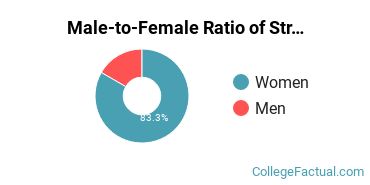 by our College Data Analytics Team
by our College Data Analytics TeamThe total graduate student population at Strayer University - Tennessee is made up of 83.3% women and 16.7% men. Note that these percentages may differ for certain degree programs.

About 88.9% of the graduate students who attend Strayer University - Tennessee are from a racial-ethnic minority group*. The following chart shows the distribution of racial-ethnic groups at the school. If you click on it, you'll find more detailed information.

The average tuition and fees for graduate students is shown below.
| In-State | Out-of-State | |
|---|---|---|
| Tuition | $14,940 | $14,940 |
| Fees | $195 | $195 |
After obtaining their master's degree from Strayer University - Tennessee, graduates go on to jobs earning an average starting salary of $55,502. When comparing to other master's degree holders, that's on the low side. It's about 5% lower than the national average of $58,425.

Get more details about the location of Strayer University - Tennessee.

Contact details for Strayer University - Tennessee are given below.
| Contact Details | |
|---|---|
| Address: | 2650 Thousand Oaks Blvd Ste 1120, Memphis, TN 38118 |
| Phone: | 877-445-7180 |
| Website: | www.strayer.edu/campus-locations/tennessee/thousand-oaks |
| Facebook: | https://www.facebook.com/StrayerUniversity |
| Twitter: | http://www.twitter.com/strayeru |
In 2020-2021, 100.0% of the graduate students at Strayer University - Tennessee took all of their classes online.

The only degree programs listed here are those in which master’s degrees were awarded in 2020-2021.
| Master’s Degree Program | Annual Graduates |
|---|---|
| Accounting | 2 |
| Business Administration & Management | 48 |
| Educational Administration | 16 |
| Health & Medical Administrative Services | 23 |
| Human Resource Management | 13 |
| Information Science | 5 |
| Information Technology | 2 |
| Public Administration | 7 |
Footnotes
*The racial-ethnic minorities count is calculated by taking the total number of students and subtracting white students, international students, and students whose race/ethnicity was unknown. This number is then divided by the total number of students at the school to obtain the racial-ethnic minorities percentage.
References
More about our data sources and methodologies.